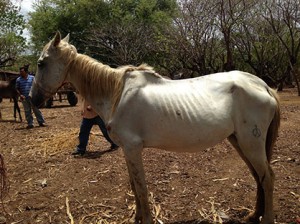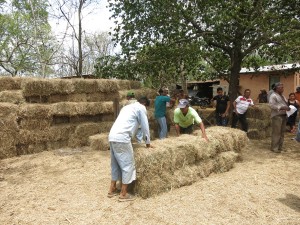Emergency Feeding of Working Horses in Nicaragua Has Begun
June, 2014- Global equine welfare charity the Brooke has started emergency feeding hundreds of starving horses in drought-stricken Nicaragua. Teams in Managua, Masaya and Rivas, where there is a great need, are distributing over 7,500 bales of pressed hay to feed over 420 horses in the month-long relief program.
The first rain in eight months fell in Nicaragua the week of June 12th, but the pastures will not recover in time to save the animals. Cattle that are old and less productive have already been slaughtered to reduce the demand on critically depleted animal feed.
A horse is the sole source of income[i] for many poor families in deprived urban parts of Nicaragua, on average supporting six family members. If a horse is sick or dies, the impact can be devastating.
The Brooke has worked in Nicaragua since 2013 training owners in equine welfare. While the charity’s focus is on providing long-term, sustainable welfare solutions for working equines, it also intervenes to offer emergency relief when disaster strikes.
Dr. Maria Elena Solorzano, a Brooke vet working in Nicaragua, said, “We have been working with these communities for some time, training equine owners, and improving the quality of animal welfare. More and more owners started coming to us saying that they couldn’t feed their horses, so we knew we had to take action. If we don’t start feeding now, animals will die. This has a huge impact on local communities.”
The Brooke will be assessing body condition at the start and the end of the feeding program. The aim is to make sure all horses maintain an acceptable body condition that allows them to continue their vital work supporting families.
Trinidad Garcia from La Ceibita, Masaya, uses her horse to plough the field, transport vegetable harvests, and carry water from a well to her house. She described the problem, saying, “The drought is one of the worst I’ve seen – our animals are starving and I’m scared about what is going to happen. Chinga is an important part of our family. She helps us with everything and I don’t know how we could survive without her.”
The Brooke works in 11 countries and this year celebrates 80 years helping to improve the lives of working horses, donkeys and mules.
[i] Horses are used mainly for the transport of goods by cart, transport of people by cart, and tourism.
The Brooke
The Brooke is an international animal welfare charity dedicated to improving the lives of working horses, donkeys and mules. The Brooke believes that animal suffering is preventable and that good animal welfare protects human livelihoods. 100 million working equines are the engines that power the developing world, doing the hardest jobs under the toughest conditions to support the livelihoods of 600 million people. That’s 9% of the world’s population. The Brooke works together with local communities to bring about lasting improvements to the lives of their working animals. With 80 years of experience from 11 different countries, the Brooke reaches more working equines than any other organisation. Last year, for the first time, the Brooke reached over one million working horses, donkeys and mules. The Brooke’s aim is to reach two million working equines each year by 2016.
1934: the Brooke’s beginnings
On arrival in Egypt in 1930, Dorothy Brooke witnessed horrifying scenes as hundreds of emaciated horses were used as beasts of burden on the streets of Cairo. Dorothy, the wife of a British cavalry officer, sought out these walking skeletons, who were once gallant war horses serving Britain, Australia and America in the First World War. When the conflict ended in 1918, they were sold into a life of hard labour in Egypt. Her pleas in a letter-to-editor were heard, and with help from the British public, Dorothy raised enough money to buy back 5,000 of the surviving horses. She then went on to set up a free veterinary clinic in Cairo in 1934 – the Old War Horse Memorial Hospital – and the beginning of the Brooke as we now know it.












